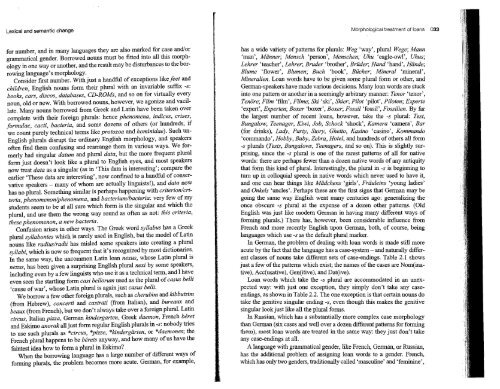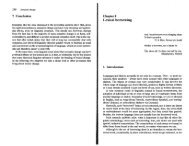You also want an ePaper? Increase the reach of your titles
YUMPU automatically turns print PDFs into web optimized ePapers that Google loves.
<strong>Lexical</strong> <strong>and</strong> <strong>semantic</strong> <strong>change</strong><br />
for number, <strong>and</strong> in many languages they are also marked for case <strong>and</strong>/or<br />
grammatical gender. Borrowed nouns must be fitted into all this morphology<br />
in one way or another, <strong>and</strong> the result may be disturbances to the borrowing<br />
language's morphology.<br />
Consider first number. With just a h<strong>and</strong>ful of exceptions like feet <strong>and</strong><br />
children, English nouns form their plural with an invariable suffix -s:<br />
books, cars, discos, databases, CD-ROMs, <strong>and</strong> so on for virtually every<br />
noun, old or new. With borrowed nouns, however, we agonize <strong>and</strong> vacillate.<br />
Many nouns borrowed from Greek <strong>and</strong> Latin have been taken over<br />
complete with their foreign plurals: hence phenomena, indices, crises,<br />
formulae, cacti, bacteria, <strong>and</strong> some dozens of others (or hundreds, if<br />
we count purely technical terms like protozoa <strong>and</strong> hominidae). Such un<br />
English plurals disrupt the ordinary English morphology, <strong>and</strong> speakers<br />
often fmd them confusing <strong>and</strong> rearrange them in various ways. We formerly<br />
had singular datum <strong>and</strong> plural data, but the more frequent plural<br />
form just doesn't look like a plural to English eyes, <strong>and</strong> most speakers<br />
now treat data as a singular (as in 'This data is interesting'; compare the<br />
earlier 'These data are interesting', now confined to a h<strong>and</strong>ful of conservative<br />
speakers - many of whom are actually linguists!), <strong>and</strong> data now<br />
has no plural. Something similar is perhaps happening with criterion/criteria,<br />
phenomenon/phenomena, <strong>and</strong> bacteriumlbacteria: very few of my<br />
students seem to be at all sure which form is the singular <strong>and</strong> which the<br />
plural, <strong>and</strong> use them the wrong way round as often as not: this criteria,<br />
these phenomenon, a new bacteria.<br />
Confusion arises in other ways. The Greek word syllabus has a Greek<br />
plural syllabontes which is rarely used in English, but the model of Latin<br />
nouns like radius/radii has misled some speakers into creating a plural<br />
syllabi, which is now so frequent that it's recognized by most dictionaries.<br />
In the same way, the uncommon Latin loan nexus, whose Latin plural is<br />
nexus, has been given a surprising English plural nexi by some speakers,<br />
including even by a few linguists who use it as a technical term, <strong>and</strong> I have<br />
even seen the startling form casi bellorum used as the plural ofcasus belli<br />
'cause ofwar', whose Latin plural is again just casus belli.<br />
We borrow a few other foreign plurals, such as cherubim <strong>and</strong> kibbutzim<br />
(from Hebrew), concerti <strong>and</strong> castrati (from Italian), <strong>and</strong> bureaux <strong>and</strong><br />
beaux (from French), but we don't always take over a foreign plural. Latin<br />
circus, Italian pizza, German kindergarten, Greek daemon, French beret<br />
<strong>and</strong> Eskimo anorak all just form regular English plurals in -s: nobody tries<br />
to use such plurals as *circus, *pizze, *kindergarten, or *daemones; the<br />
French plural happens to be berets anyway, <strong>and</strong> how many ofus have the<br />
faintest idea how to form a plural in Eskimo?<br />
When the borrowing language has a large number of different ways of<br />
forming plurals, the problem becomes more acute. German, for example,<br />
Morphological treatment of loans 033<br />
has a wide variety of patterns for plurals: Weg 'way', plural Wege; Mann<br />
'man', Manner; Mensch 'person', Menschen; Uhu 'eagle-owl', Uhus;<br />
Lehrer 'teacher', Lehrer; Bruder 'brother', Bruder; H<strong>and</strong> 'h<strong>and</strong>', Hdnde;<br />
Blume 'flower', Blumen; Buch 'book', Bucher; Mineral 'mineral',<br />
Mineralien. Loan words have to be given some plural form or other, <strong>and</strong><br />
German-speakers have made various decisions. Many loan words are stuck<br />
into one pattern or another in a seemingly arbitrary manner: Tenor 'tenor',<br />
Tenore; Film 'film', Filme; Ski 'ski', Skier; Pilot 'pilot', Piloten; Experte<br />
'expert', Experten; Boxer 'boxer', Boxer; Fossil 'fossil', Fossilien. By far<br />
the largest number of recent loans, however, take the -S plural: Test,<br />
Bungalow, Teenager, Kiwi, Job, Schock 'shock', Kamera 'camera', Bar<br />
(for drinks), Lady, Party, Story, Ghetto, Kasino 'casino', Komm<strong>and</strong>o<br />
'comm<strong>and</strong>o', Hobby, Baby, Zebra, Hotel, <strong>and</strong> hundreds of others all form<br />
-s plurals (Tests, Bungalows, Teenagers, <strong>and</strong> so on). This is slightly surprising,<br />
since the -s plural is one of the rarest patterns of all for native<br />
words: there are perhaps fewer than a dozen native words of any antiquity<br />
that form this kind of plural. Interestingly, the plural in -s is beginning to<br />
tum up in colloquial speech in native words which never used to have it,<br />
<strong>and</strong> one can hear things like Mddchens 'girls', Frauleins 'young ladies'<br />
<strong>and</strong> Onkels 'uncles'. Perhaps these are the first signs that German may be<br />
going the same way English went many centuries ago: generalizing the<br />
once obscure -s plural at the expense of a dozen other patterns. (Old<br />
English was just like modem German in having many different ways of<br />
forming plurals.) There has, however, been considerable influence from<br />
French <strong>and</strong> more recently English upon German, both, of course, being<br />
languages which use -s as the default plural marker.<br />
In German, the problem of dealing with loan words is made still more<br />
acute by the fact that the language has a case-system - <strong>and</strong> naturally different<br />
classes of nouns take different sets of case-endings. Table 2.1 shows<br />
just a few ofthe patterns which exist; the names ofthe cases are Nom(inative),<br />
Acc(usative), Gen(itive), <strong>and</strong> Dat(ive).<br />
Loan words which take the -s plural are accommodated in an unexpected<br />
way: with just one exception, they simply don't take any caseendings,<br />
as shown in Table 2.2. The one exception is that certain nouns do<br />
take the genitive singular ending -s, even though this makes the genitive<br />
singular look just like all the plural forms.<br />
In Russian, which has a substantially more complex case morphology<br />
than German (six cases <strong>and</strong> well over a dozen different patterns for forming<br />
them), most loan words are treated in the same way: they just don't take<br />
any case-endings at all.<br />
A language with grammatical gender, like French, German, or Russian,<br />
has the additional problem of assigning loan words to a gender. French,<br />
which has only two genders, traditionally called 'masculine' <strong>and</strong> 'feminine',



